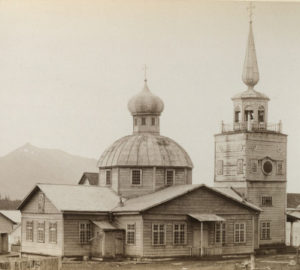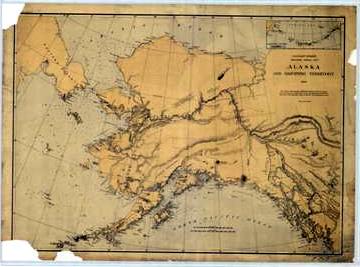Sheetʼká: A Maritime-Cultural Timeline
Sitka is located on Baranof Island… in the heart of the Tongass National Forest, the largest temperate rain forest in the world… Access to Sitka is by air or water only. While an influx of Russian Traders and American colonists in the 18th and 19th centuries has resulted in a mixed citizenry, the total Tlingit population has now rebounded…
The mission of the Kayaaní Commission is to preserve our spiritual way of life. The religion of the Tlingit was the Earth. The Tlingit are one with the Earth. (We are) here to preserve and protect traditional ways of our ancestral knowledge.
~ from sitkatribe.org, the website of the Sitka Tribe of Alaska, a Federally Recognized Tribal government (with enrollment of over 4000 tribal citizens) which oversees programs including natural and cultural resource protection.
~8,000 B.C.
Earliest evidence of indigenous peoples in Southeast Alaska
At an archeological site (49-PET-408) “On Your Knees Cave” on Prince of Wales Island, human remains were found by archeologists in 1996 1
Late 1600s
Haida Gwaii peoples arrive in SE Alaska
A group traveled by water from their traditional lands (in what is now the Queen Charlotte Islands in British Columbia) to settle in southern southeast Alaska.2
1741
Russian settlers arrive on Tlingit lands
Aleksei Chirikov and Vitus Bering sail east from Siberia, on separate vessels; the ships quickly become separated. Chirikov actually reaches America first, siting land on July 15 “at approx. latitude 56o36’ near Cape Ommaney at the southern tip of present-day Baranof Island.” 3
1774-85
Spain, France & England launch expeditions to Alaskan waters
Capt. James Hanna came to the NW Coast in 1785, “to trade for furs (primarily sea otters) that fetched high prices in China.” 4
August 1791
First written use of the term “Lingit Aani” (Tlingit land)
French ship commanded by Marchand anchors in Sitka Sound; his nautical chart gives first written use of Lingit Aani – “I restore to the bay what belongs to it, the name which it has received from its inhabitants,” records Fleurieu in his 1801 record of the voyage. 5
1799
“Old Sitka” site settled by Russian explorers
The Russians call the site Novoarkhangel’sk (Fort of Archangel Michael) 6
June 1802
Tlingits demolish fort at Old Sitka. 7a
(Correction: The Russian name Novoarkhangel’sk or “New Archangel” was not actually applied to the settlement until after the battle of 1804.)
“Tlingit warriors destroyed the original settlement, killing many of the Russians, with only a few managing to escape.” 7b
August 1804
Baranov returns to Sitka with large force that includes the warship Neva
The ship fires on the Tlingit fortification from Aug. 20-22. “Following two days of bombardment, the Tlingit ‘hung out a white flag’ on the 22nd, deserting the fort on the 26th.” 8
1823-1824
Russian Orthodox Church is introduced
Father Ioann Veniaminov journeys overland and by sea from Irkutsk (in Southcentral Russia) with his wife and infant son; after a year, the family arrives at Unalaska in the Aleutians. 9
1834
Veniaminov is transferred from Unalaska to Novoarkhangel’sk
“He devoted himself to the Tlingit people and studied their language and customs.” While in Sitka, he writes works in the Aleut language. 10

St. Michael’s Cathedral in 1887 (incorrectly identified as Greek church) from Wikipedia article about the cathedral.
1835-1840
Smallpox epidemic sweeps NW Coast & Russian America
“From Prince of Wales Island to Norton Sound, the disease devasted the population…” 11
1848
St. Michael’s cathedral is built in Sitka, reflecting increasing influence of Russian Orthodox Church
“The old cathedral, built between 1844 and 1848, remained in good shape with limited modifications for more than one hundred years, until it burned down in January 1966…” 12
1862
Pacific Northwest smallpox epidemic
This is third smallpox wave to impact Tlingit Aani. 13
October 18, 1867
Treaty of Cession with Russia: transfer ceremony takes place in Sitka
Recognizes the ceding of land from Russia to become a U.S. territory. “…the United States ‘purchased’ Alaska from Russia and did not consider the wishes of Alaska Natives or even see them as citizens. The land that belonged to Alaska Natives was now seen as ‘open land’” 14

1869 Coast Survey map from NOAA Office of Coast Survey Historical Map & Chart Collection
Summer, 1869
Tlingit clan leader Kohklux contributes to maps
U.S. Coast Survey departs Sitka by boat (led by Kohklux & George Davidson), bound for Klukwan, where an eclipse of the sun is expected over the Chilkat Valley on Aug. 8th. Kohklux (with his wives) draws maps that show the ancient trade routes of the Tlingit, then trades the maps for Davidson’s painting of the eclipse. 15
1878
Sheldon Jackson College is founded in Sitka
What would become the oldest higher learning institution in Alaska was initially founded as the “Sitka Industrial and Training School” by Fannie Kellogg and John G. Brady. The school nearly closed in 1882 when its original facility burned down. Presbyterian missionary Sheldon Jackson “came to the rescue, raising funds (for a) new building on the site of the present campus.” 16
1887
Tsimshian First Nations people arrive in SE Alaska
“Tsimshian people canoe from British Columbia to Annette Island with missionary William Duncan.” 17
1912
Alaska Native Brotherhood founded in Sitka
The organization is founded by 13 Native men who had attended the Sheldon Jackson Training School in Sitka. 18
1914
Alaska Native Brotherhood Hall is built (Sitka Camp No. 1)
Located on the waterfront in Sitka, Camp 1 is significant for being the original chapter of ANB. 19
1915
The Alaska Native Sisterhood is formed
The organization is formed by women in Wrangell, Alaska. 20
1920s-1940s
ANB & ANS hold increasing political power
Active in protesting segregation of Alaska Natives in public areas, they are, for the first half of the 20th century, the only (Alaska) organizations working for Alaska Native civil rights. 21
1942
Unangax̂ (Aleut) people are forcibly relocated to Southeast Alaska
“More than 800 Unangax̂ people are forced to relocate from their traditional lands in the Aleutian chain to SE Alaska during World War II.” 22
1945
Anti-Discrimination Act of 1945 is passed
After persistent lobbying of the Alaska State Legislature by Elizabeth Peratrovich (Ḵaax̲gal.aat) and her husband Roy, the Alaska Equal Rights Act becomes the first anti-discrimination law in the U.S. 23
1947
U.S. Navy facility at Mt. Edgecumbe is renovated
The facility becomes a 200-bed sanatorium for children with bone tuberculosis. 24
1956
ANB Harbor is built 25
Jan. 3, 1959
Alaska Statehood Act takes effect 26
Dec. 18, 1971
Alaska Native Claims Settlement Act is signed 27
1997
Sheet’ká Ḵwáan Naa Kahídi is built on Katlian St.
Modeled after a traditional Tlingit clan house, the facility is built on the site of a former school for Native children. The Community House is owned by Sitka Tribe of Alaska and serves as a gathering place and performance venue for many different groups. 28
2008
Publication of Anóoshi Lingit Aaní Ká, Russians in Tlingit America
Edited by Nora Marks Dauenhauer, Richard Dauenhauer and Lydia T. Black and published by the Sealaska Heritage Institute, this volume incorporates many Russian primary sources and Tlingit oral histories and is considered a definitive reference for this period of history. 29
2017
Indigenous People’s Day is celebrated in Southeast Alaska
The YouTube video “A Brief History of the Indigenous Peoples of Southeast Alaska” is created by Sealaska Kwaan and posted on YouTube, to recognize Indigenous People’s Day. 30
December 2018
Sitka Tribe of Alaska files suit against the State of Alaska
“Tribe alleges state mis-management of the herring fishery.” 31
October 18, 2019
Kiks.ádi Mourning & Reconciliation Ceremony in Sitka
“This is the third year that a Mourning Ceremony has been held at the base of Castle Hill (Noow Tlein) during the reenactment of the Alaska Transfer… to acknowledge the harms of colonization and to honor Native people and culture, rather than to continue celebrating the sale of stolen land from one colonial power to another.” 32
March 31, 2020
Judge rules Sitka Tribe of Alaska wins first round in lawsuit over herring fishery 33
April 2021
St. Michael’s Russian Orthodox Cathedral to welcome new priest 34
—
Special thanks to Bob Sam for providing editorial assistance with the Introduction to the Timeline.
Footnotes with Links
- Wikipedia, “On Your Knees Cave.” https://en.wikipedia.org/wiki/On_Your_Knees_Cave, citing Saleeby, Becky M. (2010). “Ancient Footsteps in a New Land: Building an Inventory of the Earliest Alaskan Sites”. Arctic Anthropology. 47 (2): 116–132.
- Sealaska Kwaan video “A Brief History of the Indigenous Peoples of Southeast Alaska” https://www.youtube.com/watch?v=oT6FNYejxBo, and Wikipedia, “Haida Gwaii.” https://en.wikipedia.org/wiki/Haida_Gwaii.
- Allan Engstrom, “Yakobi Island, the Lost Village of Apolosovo and the Fate of the Chirikov Expedition,” in Russians in Tlingit America, p. 11.
- Russians in Tlingit America, p. XXIII
- Russians in Tlingit America, p. XXVI-XXVII.
- Wikipedia, “Sitka, Alaska.” https://en.wikipedia.org/wiki/Sitka,_Alaska
- (7a) Russians in Tlingit America, p. XXX. (7b) Wikipedia, “Sitka, Alaska,” citing Khlebnikov, K.T., 1973, Baranov, Chief Manager of the Russian Colonies in America. https://en.wikipedia.org/wiki/Sitka,_Alaska
- Wikipedia, “Sitka, Alaska,” citing Khlebnikov, K.T., 1973, Baranov, Chief Manager of the Russian Colonies in America.)
- Wikipedia, “Innocent of Alaska.” https://en.wikipedia.org/wiki/Innocent_of_Alaska
- Wikipedia, “Innocent of Alaska.” https://en.wikipedia.org/wiki/Innocent_of_Alaska#Ministry_in_Alaska
- Peter Metcalf, Gumboot Determination, p. 15, quoting Dr. Robert Fortuine’s 1989 Chills and Fever, p. 230.
- Wikipedia, “St. Michael’s Cathedral (Sitka, Alaska).” https://en.wikipedia.org/wiki/St._Michael%27s_Cathedral_(Sitka,_Alaska)
- Peter Metcalf, Gumboot Determination, p. 13.)
- Wikipedia, “Alaska Natives,” citing journal article by Tucker, Landreth & Lynch: Tucker, James Thomas; Landreth, Natalie A.; Lynch, Erin Dougherty (2017). “‘Why Should I Go Vote Without Understanding What I Am Going to Vote For?’ The Impact of First Generation Voting Barriers on Alaska Natives”. Michigan Journal of Race and Law. 22: 327–382. https://en.wikipedia.org/wiki/Alaska_Natives
- Robert Woolsey for KCAW, Sitka, AK, “Alaskan Cartography Influenced by Native Mapmakers,” posted Sept. 26, 2012. https://www.kcaw.org/2012/09/26/alaskan-cartography-influenced-by-native-mapmakers/
- Wikipedia, “Sheldon Jackson College.” https://en.wikipedia.org/wiki/Sheldon_Jackson_College
- Sealaska Kwaan video “A Brief History of the Indigenous Peoples of Southeast Alaska.” https://www.youtube.com/watch?v=oT6FNYejxBo
- Wikipedia, “Alaska Native Brotherhood/Sisterhood.” https://en.wikipedia.org/wiki/Alaska_Native_Brotherhood/Sisterhood
- Wikipedia, “Alaska Native Brotherhood/Sisterhood.” https://en.wikipedia.org/wiki/Alaska_Native_Brotherhood/Sisterhood
- Wikipedia, “Alaska Native Brotherhood/Sisterhood.” https://en.wikipedia.org/wiki/Alaska_Native_Brotherhood/Sisterhood
- Wikipedia, “Alaska Native Brotherhood/Sisterhood,” citing Metcalf, Peter, A Dangerous Idea: The Alaska Native Brotherhood and the Struggle for Indigenous Rights. Fairbanks: University of Alaska Press. https://en.wikipedia.org/wiki/Alaska_Native_Brotherhood/Sisterhood
- Alaska State Archives, “Unangax̂ (Aleut) Relocation during World War II.” https://archives.alaska.gov/education/relocation.html
- “Anti-discrimination Act of 1945 | Alaska State Archives”. archives.alaska.gov. Cited in https://en.wikipedia.org/wiki/Alaska_Equal_Rights_Act_of_1945
- Alaska History and Cultural Studies – Alaska’s Heritage, Ch. 4-21, Health & Medicine, “Tuberculosis is Alaska’s Number One Disease.” http://www.akhistorycourse.org/articles/article_artID_186/
- Mar. 2021 interview with Sitka Harbormaster Stan Eliason
- Wikipedia, “Alaska Statehood Act.” https://en.wikipedia.org/wiki/Alaska_Statehood_Act
- Federal Indian Law for Alaska Tribes, University of Alaska Fairbanks Unit 3. https://www.uaf.edu/tribal/112/unit_3/alaskanativeclaimssettlementactancsa1971.php
- Wikipedia, “Sheet’ká Ḵwáan Naa Kahídi.” https://en.wikipedia.org/wiki/Sheet%27k%C3%A1_%E1%B8%B4w%C3%A1an_Naa_Kah%C3%ADdi
- Anóoshi Lingit Aaní Ká, Russians in Tlingit America: The Battles of Sitka, 1802 and 1804, ed. by Nora Marks Dauenhauer, Richard Dauenhauer and Lydia T. Black, published by Sealaska Heritage Institute, University of Washington Press, 2008.
- “A Brief History of the Indigenous Peoples of Southeast Alaska” is created by Sealaska Kwaan and posted on YouTube. https://www.youtube.com/watch?v=oT6FNYejxBo
- Katherine Rose & Emily Kwong for KCAW, Sitka, AK, “Sitka Tribe sues state, claims mismanagement of herring fishery,” posted Dec. 18, 2018. https://www.kcaw.org/2018/12/18/sitka-tribe-sues-state-claims-mismanagement-of-herring-fishery/
- Ari Snyder for KCAW, Sitka, AK, “Kiks.ádi Mourning Ceremony climbs Castle Hill in a march toward ‘Reconciliation’” posted Oct. 23, 2019. https://www.kcaw.org/2019/10/23/kiks-adi-mourning-ceremony-climbs-castle-hill-in-a-march-toward-reconciliation/
- Katherine Rose for KCAW, Sitka, AK, “Sitka Tribe wins first round in suit against state,” posted April 2, 2020. https://www.kcaw.org/2020/04/02/sitka-tribe-wins-first-round-in-suit-against-state/
- Per congregant and groundskeeper Jennifer Young
Sources Consulted
- Dauenhauer, Nora Marks, Dauenhauer, Richard, and Black, Lydia, T., eds. Anóoshi Lingit Aaní Ká, Russians in Tlingit America: The Battles of Sitka, 1802 and 1804. Juneau, Alaska: Sealaska Heritage Institute, University of Washington Press, 2008.
- Metcalf, Peter. Gumboot Determination: The Story of the SouthEast Alaska Regional Health Consortium. Juneau, Alaska: SouthEast Alaska Regional Health Consortium, 2005.
- Various online sources, as noted in footnotes.
